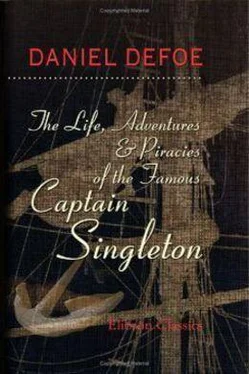We thought our voyaging was at a full stop now; but three of us, with a couple of our negroes, mounting the hills another way, to view the course of the river, we found a fair channel again after about half a mile's march, and that it was like to hold us a good way further. So we set all hands to work, unloaded our cargo, and hauled our canoes on shore, to see if we could carry them.
Upon examination we found that they were very heavy; but our carpenters, spending but one day's work upon them, hewed away so much of the timber from their outsides as reduced them very much, and yet they were as fit to swim as before. When this was done, ten men with poles took up one of the canoes and made nothing to carry it. So we ordered twenty men to each canoe, that one ten might relieve the other; and thus we carried all our canoes, and launched them into the water again, and then fetched our luggage and loaded it all again into the canoes, and all in an afternoon; and the next morning early we moved forward again. When we had towed about four days more, our gunner, who was our pilot, began to observe that we did not keep our right course so exactly as we ought, the river winding away a little towards the north, and gave us notice of it accordingly. However, we were not willing to lose the advantage of water–carriage, at least not till we were forced to it; so we jogged on, and the river served us for about threescore miles further; but then we found it grew very small and shallow, having passed the mouths of several little brooks or rivulets which came into it; and at length it became but a brook itself.
We towed up as far as ever our boats would swim, and we went two days the farther—having been about twelve days in this last part of the river—by lightening the boats and taking our luggage out, which we made the negroes carry, being willing to ease ourselves as long as we could; but at the end of these two days, in short, there was not water enough to swim a London wherry.
We now set forward wholly by land, and without any expectation of more water–carriage. All our concern for more water was to be sure to have a supply for our drinking; and therefore upon every hill that we came near we clambered up to the highest part to see the country before us, and to make the best judgment we could which way to go to keep the lowest grounds, and as near some stream of water as we could.
The country held verdant, well grown with trees, and spread with rivers and brooks, and tolerably well with inhabitants, for about thirty days' march after our leaving the canoes, during which time things went pretty well with us; we did not tie ourselves down when to march and when to halt, but ordered those things as our convenience and the health and ease of our people, as well our servants as ourselves, required.
About the middle of this march we came into a low and plain country, in which we perceived a greater number of inhabitants than in any other country we had gone through; but that which was worse for us, we found them a fierce, barbarous, treacherous people, and who at first looked upon us as robbers, and gathered themselves in numbers to attack us.
Our men were terrified at them at first, and began to discover an unusual fear, and even our black prince seemed in a great deal of confusion; but I smiled at him, and showing him some of our guns, I asked him if he thought that which killed the spotted cat (for so they called the leopard in their language) could not make a thousand of those naked creatures die at one blow? Then he laughed, and said, yes, he believed it would. "Well, then," said I, "tell your men not to be afraid of these people, for we shall soon give them a taste of what we can do if they pretend to meddle with us." However, we considered we were in the middle of a vast country, and we knew not what numbers of people and nations we might be surrounded with, and, above all, we knew not how much we might stand in need of the friendship of these that we were now among, so that we ordered the negroes to try all the methods they could to make them friends.
Accordingly the two men who had gotten bows and arrows, and two more to whom we gave the prince's two fine lances, went foremost, with five more, having long poles in their hands; and after them ten of our men advanced toward the negro town that was next to us, and we all stood ready to succour them if there should be occasion.
When they came pretty near their houses our negroes hallooed in their screaming way, and called to them as loud as they could. Upon their calling, some of the men came out and answered, and immediately after the whole town, men, women, and children, appeared; our negroes, with their long poles, went forward a little, and stuck them all in the ground, and left them, which in their country was a signal of peace, but the other did not understand the meaning of that. Then the two men with bows laid down their bows and arrows, went forward unarmed, and made signs of peace to them, which at last the other began to understand; so two of their men laid down their bows and arrows, and came towards them. Our men made all the signs of friendship to them that they could think of, putting their hands up to their mouths as a sign that they wanted provisions to eat; and the other pretended to be pleased and friendly, and went back to their fellows and talked with them a while, and they came forward again, and made signs that they would bring some provisions to them before the sun set; and so our men came back again very well satisfied for that time.
But an hour before sunset our men went to them again, just in the same posture as before, and they came according to their appointment, and brought deer's flesh, roots, and the same kind of corn, like rice, which I mentioned above; and our negroes, being furnished with such toys as our cutler had contrived, gave them some of them, which they seemed infinitely pleased with, and promised to bring more provisions the next day.
Accordingly the next day they came again, but our men perceived they were more in number by a great many than before. However, having sent out ten men with firearms to stand ready, and our whole army being in view also, we were not much surprised; nor was the treachery of the enemy so cunningly ordered as in other cases, for they might have surrounded our negroes, which were but nine, under a show of peace; but when they saw our men advance almost as far as the place where they were the day before, the rogues snatched up their bows and arrows and came running upon our men like so many furies, at which our ten men called to the negroes to come back to them, which they did with speed enough at the first word, and stood all behind our men. As they fled, the other advanced, and let fly near a hundred of their arrows at them, by which two of our negroes were wounded, and one we thought had been killed. When they came to the five poles that our men had stuck in the ground, they stood still awhile, and gathering about the poles, looked at them, and handled them, as wondering what they meant. We then, who were drawn up behind all, sent one of our number to our ten men to bid them fire among them while they stood so thick, and to put some small shot into their guns besides the ordinary charge, and to tell them that we would be up with them immediately.
Accordingly they made ready; but by the time they were ready to fire, the black army had left their wandering about the poles, and began to stir as if they would come on, though seeing more men stand at some distance behind our negroes, they could not tell what to make of us; but if they did not understand us before, they understood us less afterwards, for as soon as ever our men found them to begin to move forward they fired among the thickest of them, being about the distance of 120 yards, as near as we could guess.
It is impossible to express the fright, the screaming and yelling of those wretches upon this first volley. We killed six of them, and wounded eleven or twelve, I mean as we knew of; for, as they stood thick, and the small shot, as we called it, scattered among them, we had reason to believe we wounded more that stood farther off, for our small shot was made of bits of lead and bits of iron, heads of nails, and such things as our diligent artificer, the cutler, helped us to.
Читать дальше












